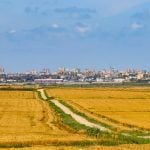The Canadian farm lobby often complains that governments do not pay them enough heed, that farmers are taken for granted. True as that may be sometimes, things always could be worse.
Just ask David King, the Paris-based secretary general of the International Federation of Agriculture Producers.
In theory, IFAP is the global voice for organized farmers with member organizations in scores of countries. His job is to make sure the farmer agenda is recognized in international circles, whether at the United Nations in New York, the World Food Summit in Rome or the Earth Summit in Brazil.
Read Also

Kochia has become a significant problem for Prairie farmers
As you travel through southern Saskatchewan and Alberta, particularly in areas challenged by dry growing conditions, the magnitude of the kochia problem is easy to see.
In practice, the IFAP constituency – close to two billion farmers around the world – is close to invisible when United Nations movers and shakers are setting priorities.
King complains that the United Nations consistently ignores farmers, preferring to cozy up to business interests and to listen to loud, issue-promoting non-governmental organizations.
In a summer IFAP newsletter, King notes the farm community was not recognized in the final communique issued from a UN social summit in Denmark in 1995, nor in the draft of the 1997 report on environmental issues, five years after the Brazil earth summit.
“At the social summit or at the world food summit,” he wrote, senior UN officials “paid tribute to the contribution of non-governmental organizations, business, labor, women, scientists, politicians, etc. but they left out the farmer, and at a food conference!”
Why are farmers neglected in the UN?
From Paris last week, King speculated that it has much to do with the struggle by the UN to stay relevant and financially solvent. “The UN feels that farmers cannot help it find a new raison d’etre,” he said. “Governments are asking questions about the usefulness of the UN and cutting UN funding.”
So the international body looks to NGOs to help define new political campaigns. “Politically, farmers are not as interesting as, for example, indigenous people,” said King. And it looks to corporations for donations. “Financially, farmers cannot help the UN as much as business and industry.”
Besides, world hunger now is a question of poverty and distribution, rather than production. “There is plenty of food available to feed the planet, so farmers are simply taken for granted.”
Naturally, as a farmer advocate, King and IFAP argue that the world ignores or marginalizes agricultural issues at its peril.
“History has shown that there is a fine line between a food surplus and a food shortage,” he said. “If countries neglect their agriculture and their farmers, it will surely come back to haunt them one day.”
Of course, by talking to IFAP members like the Canadian Federation of Agriculture, King is talking to the converted.
To have any impact, the message would have to be embraced by politicians like foreign affairs minister Lloyd Axworthy.
But like most UN members, Canada has shown little inclination to ensure that the contribution and potential for rural and agricultural communities is recognized in international affairs.
















